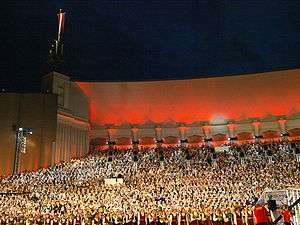Latvian Song and Dance Festival

The Latvian Song and Dance Festival (Latvian Vispārējie latviešu Dziesmu un Deju svētki) is one of the largest amateur choral events in the world and an important event in Latvian culture and social life. It is also a Masterpiece of the Oral and Intangible Heritage of Humanity. The All-Latvian Song and Dance Festival has been held since 1873, normally every five years. During the festivals exhibitions of photography, art and folk craft, orchestra concerts, and a festive parade also take place. Events and competitions leading up to the event occur throughout the period between festivals.
Approximately 40,000 performers altogether participate in the event.[1] Folk songs and classical choir songs are sung, with emphasis on a cappella singing, though modern popular songs have recently been incorporated into the repertoire as well.
History
The tradition of song festivals originated in the first half of the 19th century in many European countries and later was also organized by the Baltic Germans. The first steps taken in Latvian environment was during the song days in Dikļi in 1864, which led to the resounding of a full-scale song festival in Riga during the summer of 1873. 1003 singers and 30 orchestra players participated in the first festival. Only once has the festival been held outside Riga, in Jelgava in 1895.
During the Soviet invasion and annexation of Latvia in 1940, festivals were continuing in the Latvian SSR, which were celebrating the Soviet Union (to allow its continuous existence). During the occupation the festival tradition was continued in exile, first in displaced persons camps after World War II, primarily in the western zones in Germany, then in the United States, Canada, and Australia. The Overseas Song and Dance Festival is currently held every four years, alternating between the United States and Canada.
Since 1960, a distinct Latvian Youth Song and Dance Festival is held in an alternate five-year cycle, on a matching scale.[2]
The 24th Festival was held in July 2008. The main events were held at the Mežaparks Great Bandstand and the Daugava Stadium in Riga.
The 25th Festival took place in July 2013.[3]
The 26th Festival took place in 2018, marking the 100th anniversary of Latvian independence. The 27th edition will be held in July 2023, marking the festival's sequicentennial jubillee anniversary.
Additional festivals were held in 2001 and 2011, both on major anniversaries of the founding of Riga.
See also
References
- ↑ 23rd All Latvian Song Festival retrieved on 7 March 2007
- ↑ 10th Latvian Youth Song and Dance Celebration in Riga retrieved on June 28, 2011
- ↑ XXV Nationwide Latvian Song and XV Dance Celebration Website retrieved on July 6, 2013
External links
- Law of Song and Dance festivals
- Pictures of the event
- Pictures of the event in 2003 and 2008
- www.bestriga.com When Many Become One
- URL for next event in 2013, redirects to Latvian Choirs
- Day of Song celebrating 75th anniversary of First Latvian Song Festival, at the Fischbach Displaced Persons Camp (Fischbach nei Nűrnberg)
- URL for upcoming Latvian Song and Dance Festival in Baltimore, MD, USA in 2017